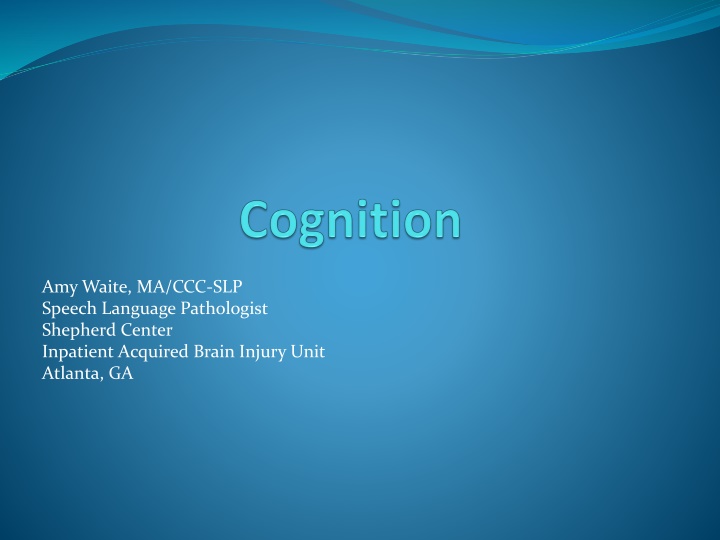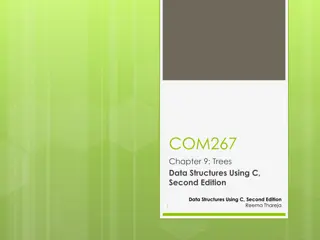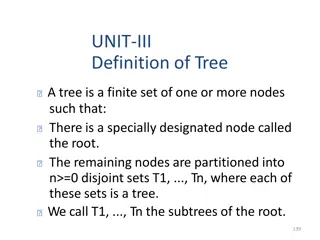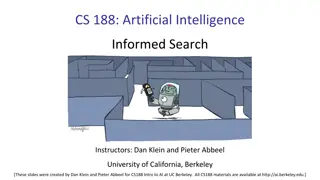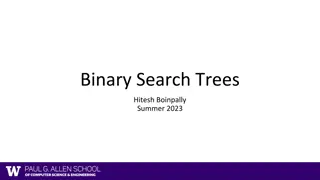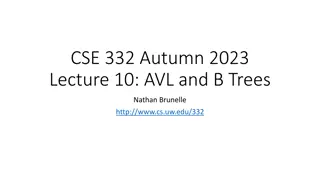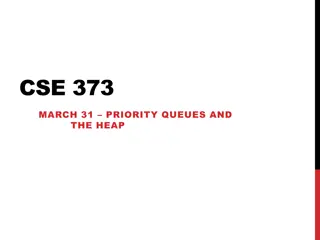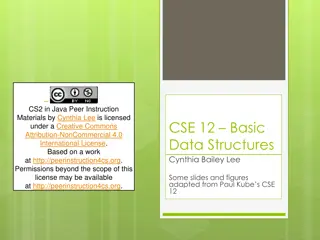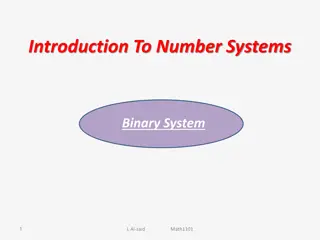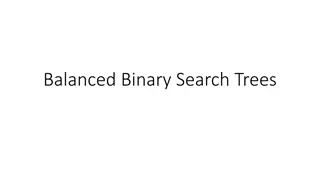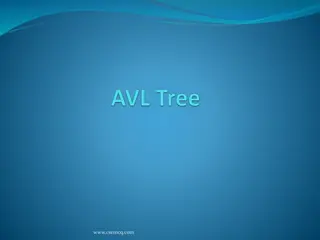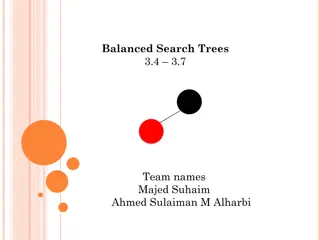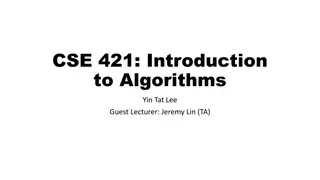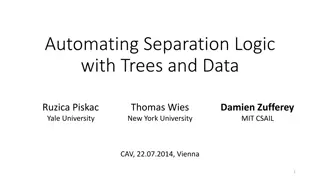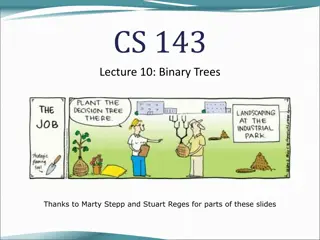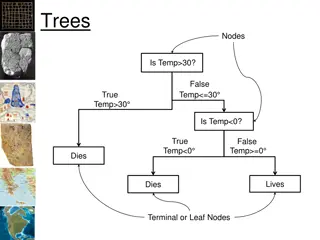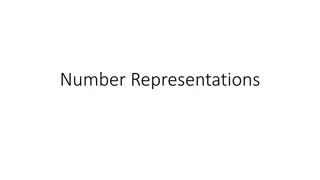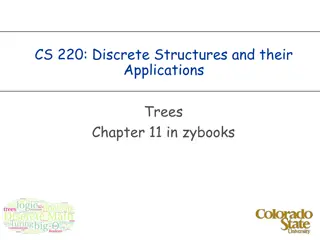Binary Search Trees: Lecture Highlights and Announcements
Explore the key topics covered in a lecture on Binary Search Trees, including tree terminology, tree traversals, and practice exercises. Get updates on office hours and homework statistics. Dive into tree structures and their operations in this informative session.
Download Presentation

Please find below an Image/Link to download the presentation.
The content on the website is provided AS IS for your information and personal use only. It may not be sold, licensed, or shared on other websites without obtaining consent from the author.If you encounter any issues during the download, it is possible that the publisher has removed the file from their server.
You are allowed to download the files provided on this website for personal or commercial use, subject to the condition that they are used lawfully. All files are the property of their respective owners.
The content on the website is provided AS IS for your information and personal use only. It may not be sold, licensed, or shared on other websites without obtaining consent from the author.
E N D
Presentation Transcript
Amy Waite, MA/CCC-SLP Speech Language Pathologist Shepherd Center Inpatient Acquired Brain Injury Unit Atlanta, GA
Some Statistics 1.7 to 2 million traumatic brain injuries annually. Cognitive deficits are the most common deficit following TBI, including mild TBI/concussion. Approximately 50,000 deaths per year from TBI Roughly 80,000 per year released from hospital with severe TBI-related disabilities. Approximately 5.3 million Americans live with some degree of cognitive-linguistic impairment.
Minsky MA said: If the brain was simple enough to be understood- we would be too simple to understand it.
I think there I am Renee Descartes
What is Cognition? the mental action or process of acquiring knowledge and understanding through thought, experience, and the senses. Synonyms: perception, discernment, apprehension, learning, understanding, comprehension Definition per Google.
Basic Components of Cognition: Consciousness Attention/Concentration 1. Focused 2. Sustained 3.Divided Memory: short term vs long term vs procedural 1. Working Memory- temporary storage of limited capacity 2. Declarative a person s knowledge base, conscious awareness 3. Non-declarative procedural. Unconscious awareness Reasoning/Problem Solving/Judgement Thought organization/ Planning Processing Speed
Executive Functions Definition: The ability to plan, organize, strategize and focus on a specific goal directed activity. Can occur even in mild TBI Spitz, Ponsford et. al (2012): Deficits in executive functions following TBI can be profound and debilitating, and executive function deficits have the strongest effect on functional outcomes. So, what EXACTLY is it?
Executive Functioning at Its Core Identifying of a goal/objective/need. Planning steps or stages to achieve goal or meet need. Self-evaluation initially, throughout, + at end of process Self-awareness- what I could have done or be doing better or differently to improve outcome Cognitive Flexibility / Mental Flexibility There is more than one way to skin a cat. Self-application as I learn or receive new information can apply it to myself or my situation.
Most Common Long Term Cognitive Deficits Attention/Concentration Problems Processing Speed Short Term Memory deficits. Most common deficit with anoxic brain injuries is short term memory impairment. Most common cognitive deficit in a CVA patient with aphasia is attention.
Formal Evaluations Burns Brief Inventory of Head Injury - Screen Cognitive Linguistic Quick Test (CLQT) Screen Scales of Cognitive Ability for Traumatic Brain Injury (SCATBI) Behavioural Assessment of Dysexecutive Syndrome (BADS) Test of Memory And Learning -2 (TOMAL-2) Functional Assessment of Verbal Reasoning and Executive Strategies (FAVRES)
Informal Evaluation Observation at meals, bathing, dressing etc. In-center outings including finding own room Conversations Puzzles Board games On-line or Ipad games or puzzles Reading activities
What can I do to help? Does it work?
Is Cognitive Rehab Evidence Based? Yes! Many studies prove the benefit of cognitive rehabilitation ~Cicerone et. al. (2005) BUT need to define the treatment factors and patient characteristics that optimize clinical outcomes. In other words: We know it works but exactly what techniques at what time in the recovery process have yet to be defined.
Evidence Based Treatments Attention: Attention Process Training (APT) for post acute TBI. Problem Solving: training in formal problem solving strategies and their application to every day situations and functional activities during post acute rehab. Executive Functioning: metacognitive strategy training (self monitoring/self regulation) as component of interventions for deficits in attention, neglect and memory. Memory: use of memory notebooks or electronic device post PTA for moderate to severe and internal strategies for mild deficits. Also, Errorless Learning and Spaced Retrieval. Processing Speed: Time Pressure Management
Functional/No Formal Studies Treatment Ideas Games/puzzles with cards, board games, or electronic Routing in-center, outside, out of center Conversations Meal times Showering/bathing and dressing Reading newspapers or watching news programs Memory signs or timer reminders Building simple things birdhouse kits etc. Painting/drawing Gardening- small potted plants or vegetables Groups Verbal problem solving talking through a task
Vegetative State Rancho 2 Minimally Conscious State- Rancho 2-3
Evaluation Coma Recovery Scale Revised Rappaport Coma/ Near Coma Scale Glasgow Coma Scale Important Point: These are extremely useful, when used correctly, in evaluating responses in an unequivocal manner.
Treatment Positioning/Seating Sensory Stimulation ? Family education Educating the family Teaching the family about emergence Teaching the family what to do Sense a theme?
Thank you! Any Questions? Recommended Reading: Cicerone, K.M. et. al. Evidence-Based Cognitive Rehabilitation: Recommendations for Clinical Practice. (2000) Archives of Phys. Med. Rehab (81) 1596-1615 2 additional updates: 2005 and 2011 My email: amy_waite@shepherd.org
